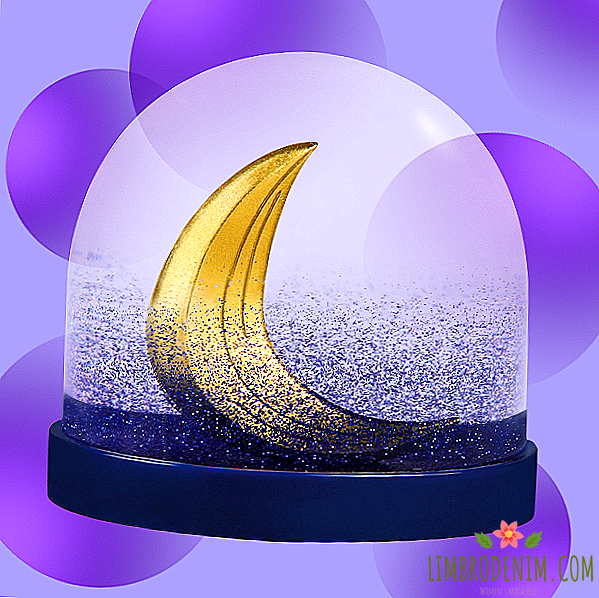I have a narcissistic mother: How to overcome the toxic effects of parents
At seventeen, I entered university and left home, then she moved to Moscow, and soon left Russia at all. My father, having been divorced with his mother for a long time, died when I was twenty. Even, probably, about three years ago, when I asked what my relationship with my mother was, I answered - normal. Not the closest, but we regularly, once a week, talk on the phone, in the course of each other's life. I try to visit her every year or two. I remember how she tried to give me emotional support when I was going through a painful separation from a young man. Her words didn't help much, but I appreciated the participation.
The feeling that something important in my life was wrong came three or four years ago, after the end of another relationship. In the course of reflection, I realized that the succession of failed novels can only partly be explained by the unpleasant qualities of partners and that the matter in the type that attracts me is in the pattern of my attachments. From time to time it was inaccessible, toxic, sometimes abused people.

Instead of support, approval, the mood that everything will turn out, the result of my communication with her was low self-esteem, depression, waiting for a collapse on all fronts and an understanding that you can only rely on yourself and, in more adulthood, on trusted friends.
Awareness of the connection between childhood and the present takes time and effort. I devoted about three years to this, using a wide variety of practices: yoga, meditation, Latin American shamanism, traditional and alternative therapists. In the process of this work, memories often arise that are usually associated with the mother. For example, as she has on any of my cues, an expression of opinion or a question has always been a thorough, reasonable, detailed answer. About her and for herself. Any of our communication was used for self-affirmation, and she didn’t give a damn what exactly I was thinking or feeling and what I was actually talking about. My words were just a springboard, thanks to which she could jump up, lift herself up and, as a result, talk at length and at length on any topic touched, and look, probably, caring, experienced, knowing a lot - in her eyes.
She never cared what I really wanted - because she knew better what I should want in the script, where she is my mother and I am her daughter. I was interested in languages and journalism, but she decided that I should enroll in Russian language and literature, because I read a lot and correctly wrote. I was so uninteresting that, having suffered three courses, I left the university and went to Moscow - along the way I independently mastered print and television journalism, doing it professionally, and learned several languages. In response, she reproached me for years with an unfinished education, although this circumstance never prevented me from getting a job.
I make up
I studied best at school and the first in three hundred and fifty years of its existence I graduated with a medal. But the number of my awards, grants, professional recognition never interested the mother — she was only interested in how much the reality tragically diverged from the picture in her head. From the age of seventeen I worked and provided for myself. She always had little, always had something to criticize me for.
In families where parents beat children, the aubus is obvious, it is obvious and tangible. In situations like mine, everything is so subtle, hidden and confusing that you can deal with all this for years. Awareness of the toxicity of parents contradicts the psyche of the child, in which they are equal to life itself - accordingly, it is impossible to criticize them. Therefore, we include the mechanisms of adaptation and explain to ourselves that if the father does not pay attention, it means that we do not deserve it. And if mom criticizes, it’s because we’re really not learning a lot or doing well or working. Having mastered this mechanism from an early age as the only way to survive, we simply carry it with us into adulthood, often losing touch with reality during the years of parental abuses.
I remember that at the university — in fact, Russian and literature — I had severe depressive episodes, for no apparent reason, I was just covered by a dull hopelessness that could last for days and weeks. My mother answered me on the phone and scolded me for “inventing” and told me not to play the fool. At the end of the third year I got into a car accident, and the month spent in the hospital helped me decide on priorities for the near future and, barely recovered, go to Moscow. It is now I understand that this type of non-external causes of depression is standard for people who grew up with parents like my mother, with borderline and narcissistic personality disorder. But until then I had thought for years that something was wrong with me.

And so it would be sympathetic to pokokokat language. It is now I understand that trying to determine in seven years what a child’s figure will have when it becomes an adult woman is absurd. But it cost me many years living with the conviction that I have a “terrible” figure. To my amazement, this did not affect my popularity with men. But this, undoubtedly, influenced the quality of these men. With chronic low self-esteem, we either cannot present the necessary quality criteria to potential partners, or these criteria are very low.
At thirteen, I developed a dependency on food, when I lived with my grandmother and went to school five days a week, and went to my mom and stepfather for the weekend to work hard on the farm all weekend. The moments when I came from school and, having done my homework, went to my grandmother's kitchen to drink cocoa and jam it with butter cookies while reading a book, it was the best time of the day, the only truly pleasant event, as I understand it now. Since I had no previous experience like this, my mother did not live with me at that moment, and my grandmother’s parenting duties were limited to cooking dinner for me, I naively did not understand the connection between the amount of cocoa and cookies and the subsequent changes in weight. I was very surprised when I recovered strongly to the ninth grade. It is now that I weigh fifty-four kilograms in clothes, but then my weight has exceeded seventy, simply crushing the already fragile self-esteem.
Not my responsibility
All these situations from childhood have surfaced and surfaced in my head over the past few years. The trigger for change was another manipulative message from the mother, sent, as always, suddenly: "How are you, is everything all right?" And, since I did not rush to answer instantly, being in another country and another time zone and being busy with my own affairs, after him: "Answer me, I worry !!" Then I got really angry. Yes, I, certainly, should throw everything, where and what I, the adult professional, at this moment would not be engaged, and rush to answer - keep your pocket wider. Up to this point, I thought that my mother was just plain bad, but then it dawned on me that this was pure, concentrated toxicity, sometimes turning into emotional and psychological abuse. Typing in the search engine "toxic parents", I was amazed at the quantity and quality of information on the subject, books of psychologists, support groups, advice and a variety of recommendations.
The one from which I suffered all my childhood and after it, it turns out, had a name — narcissism — and it fit into a coherent psychological theory; it happened to other people, it was described and analyzed by experts many times. The feelings of the mother, her tantrums, paranoia, heightened anxiety, chronic negative and eternal criticality towards me and her partners - all this was not my responsibility. The feeling could be compared with the fact that as if the window that had not been washed was rubbed over, bright sunlight poured into the room and everything fell into place.
This is a difficult and very emotional process. Awareness of all the trauma, all the responsibility of a parent or parent, all the harm done to a sincere and open, loving child over the years is hard. One of the main elements of the process is shifting responsibility from yourself to the one who is truly guilty of the situation. Rethinking life priorities, when the feelings of another person (parent, partner) are removed from the unlawful priority shelf and occupy a proper niche that is far below your own feelings, desires, plans and ambitions. Attention is primarily to yourself and not to another. Self love and self care that no one else can do but you.
Not the parent of his mother
Anyway, any such awareness is just the beginning of the process. This is a daily work, a daily choice between oneself and another person in favor of oneself - the choice of one’s interests, values, desires and plans. During this process, it is very important to remember that you are an adult, an individual, and your parents no longer have power over you, except the one that you yourself give them.
Recently, at the thought of a telephone conversation with my mother, my body has a physical sensation of death. Death as opposites of everything I've ever sought: joy, love, harmony, self-realization, career growth. Therefore, I have limited my communication with her to the limit, and when it happens, then under my strict control and on my terms. I can no longer afford to invest time and energy in communication, which makes me physically and emotionally ill. I no longer take responsibility for the feelings of the mother, for her "unfolded" life and the fact that there are "only morons around her and no one to talk to," for how hard she is. She is an adult, and at every stage leading to her current position, she made the appropriate choice. I can no longer behave like my mother's parent - and so, in fact, I spent a huge part of my childhood in caring for her feelings, in the falsely inspired responsibility for her mood. I am learning to choose myself first of all, and it doesn’t matter if it is a relationship with a mother or with any other person. I no longer depend on the opinions of others about me, from other people's assessments and words. I gradually become the master of my own life.
What to do?
Here is what I tried myself and what I can advise based on my own experience:
 pass a toxicity test with parents;
pass a toxicity test with parents;
 read Susan Forward Toxic Parents and do the exercises described in the book;
read Susan Forward Toxic Parents and do the exercises described in the book;
 Finding groups on a topic on Facebook - the opportunity to listen to other people's, but painfully familiar stories and speak out without fear of the condemnation in response that such groups provide is very helpful;
Finding groups on a topic on Facebook - the opportunity to listen to other people's, but painfully familiar stories and speak out without fear of the condemnation in response that such groups provide is very helpful;
 find the Al-Anon group closest to you (not to be confused with AA), go to a few meetings and see if this paradigm works for you - originally created for relatives of alcoholics, these groups gradually went beyond the primary framework and are a good container for expressing even the most complex and heavy emotions without fear of conviction;
find the Al-Anon group closest to you (not to be confused with AA), go to a few meetings and see if this paradigm works for you - originally created for relatives of alcoholics, these groups gradually went beyond the primary framework and are a good container for expressing even the most complex and heavy emotions without fear of conviction;
 read about narcissism and determine if its features are in your loved ones;
read about narcissism and determine if its features are in your loved ones;
 find any opportunity to physically separate from the parent, that is, to move to another place;
find any opportunity to physically separate from the parent, that is, to move to another place;
 if you do not physically live with your parents, but their presence in your life is more than a comfortable norm, to conduct a separation, during which you should carefully observe your own feelings about what is happening;
if you do not physically live with your parents, but their presence in your life is more than a comfortable norm, to conduct a separation, during which you should carefully observe your own feelings about what is happening;
 work with a sensible therapist;
work with a sensible therapist;
 if it is possible, go for several sessions of EMDR-therapy, preferably attachment focused (AF-EMDR);
if it is possible, go for several sessions of EMDR-therapy, preferably attachment focused (AF-EMDR);
 with unwanted, but inevitable conversation with a toxic parent, in person or by phone, you can visualize a wall between you that protects you. You can also visualize a person or another beneficiary who is pleasant to you and in whose presence you feel safe;
with unwanted, but inevitable conversation with a toxic parent, in person or by phone, you can visualize a wall between you that protects you. You can also visualize a person or another beneficiary who is pleasant to you and in whose presence you feel safe;
 do meditation.
do meditation.
Collage photos:pixelrobot - stock.adobe.com, ksena32 - stock.adobe.com (1, 2), byjeng - stock.adobe.com, wabeno - stock.adobe.com




